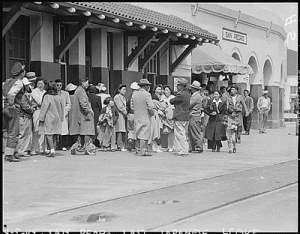U.S. & Syrian refugeesVirginia mayor says WWII Japanese internment “inspires” his policies toward Syrian refugees
Roanoke, Virginia, mayor David Bowers (D) got into hot water on Wednesday when he issued a statement citing the U.S. internment of Japanese during the Second World War as an inspiration for his decision to delay assistance to Syrian refugees. Roosevelt, in the name of national security, ordered the forcible relocation of more than 100,000 Japanese immigrants and Japanese-Americans living in the United States to internment camps for more than three years. The internment is regarded as one of the most serious civil-liberties violations committed by the U.S. government.

Japanese-Americans awaiting transport to internment camp // Source: commons.wikimedia.com
Roanoke, Virginia, mayor David Bowers (D) got into hot water on Wednesday when he issued a statement citing the U.S. internment of Japanese during the Second World War as an inspiration for his decision to delay assistance to Syrian refugees.
In his statement, Bowers praised Roosevelt’s decision, in the name of national security, to quarantine more than 100,000 Japanese immigrants and Japanese-Americans living in the United States in internment camps for more than three years.
Bowers said that in the wake of the Paris terror attacks, the United States should treat the Syrian refugee crisis with the same seriousness.
“I’m reminded that President Franklin D. Roosevelt felt compelled to sequester Japanese foreign nationals after the bombing of Pearl Harbor, and it appears that threat of harm to America from ISIS now is just as real and serious as that from enemies then,” Bowers said in his statement.
Business Insider reports that the mayor appears to make a distinction between Japanese-Americans and Japanese “foreign nationals,” but many families in the early 1940s comprised immigrant Japanese citizens and their Japanese-American children.
Even at the time, but certainly since then, the internment of the Japanese is regarded as one of the most serious civil-liberties violations committed by the U.S. government.
Japanese families forcibly relocated to the internment camps lost assets, businesses, and homes, and when they came back from internment were greeted by prejudice and discrimination.
The conditions in the internment camps were harsh.
President George H. W. Bush, in 1991, issued a formal apology accompanying the federal government’s reparations payments to Japanese-Americans, saying the United States should “recognize that serious injustices were done.”
“A monetary sum and words alone cannot restore lost years or erase painful memories; neither can they fully convey our nation’s resolve to rectify injustice and to uphold the rights of individuals,” Bush said. “We can never fully right the wrongs of the past, but we can take a clear stand for justice and recognize that serious injustices were done to Japanese Americans during WW II.”
About half of U.S. governors have said they will refuse to admit Syrian refugees within their borders, and the House will vote today on imposing strict conditions on the administration’s Syrian refugee resettlement program.
Legal analysts say that the call by the governors is a political move with no legal standing.
“States have absolutely no legal authority to bar someone who is granted refugee status from entering their state, since it’s federal law that determines whether someone is a refugee,” Greg Chen, director of advocacy at the American Immigration Lawyers Association, told Business Insider
